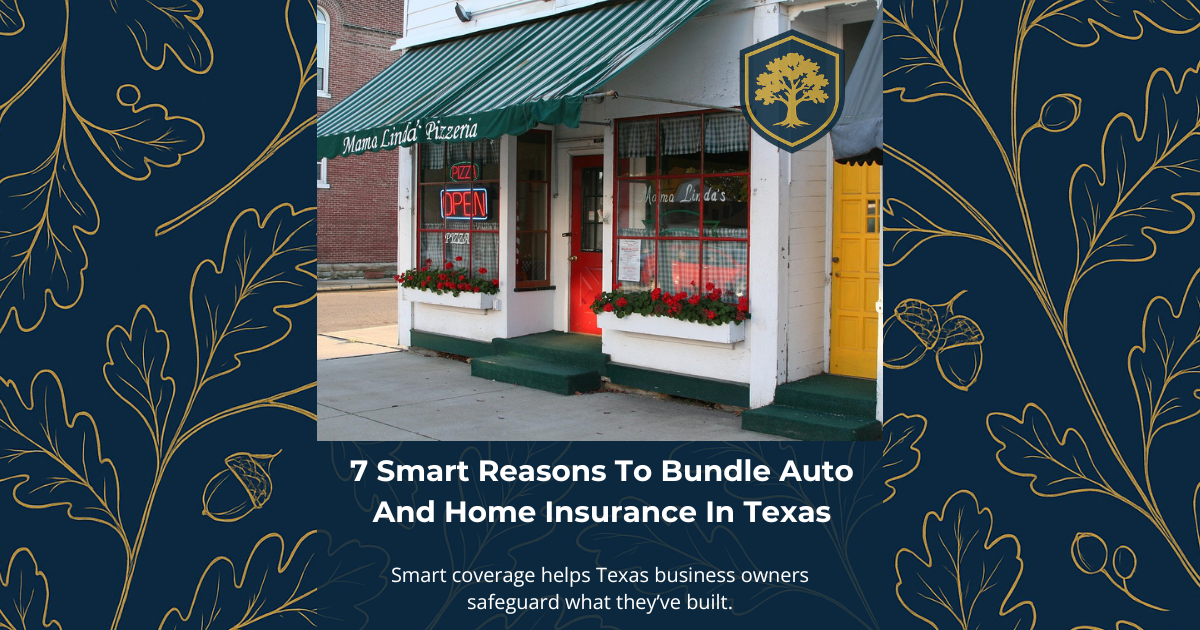5 Essential Types of Small Business Insurance Texas Owners Need
Running a small business in Texas comes with plenty of opportunity—and just as many unexpected risks. Whether you own a neighborhood café in Fort Worth, a boutique in Keller, or a contracting company in Dallas, the right small business insurance Texas coverage can mean the difference between a minor setback and a major financial loss.
From property damage to employee injuries, every business faces potential surprises. The good news? You can prepare for them. Let’s look at five essential types of coverage every Texas business owner should know about—and why they matter.
1. General Liability Insurance — Your First Line of Defense
Think of general liability insurance as your business’s foundation. It protects against the everyday mishaps that can happen on or off your property—like a customer slipping on a wet floor or an advertising error that costs another company money.
Most commercial clients and landlords in Texas require proof of general liability insurance before doing business, so it’s often the first policy you’ll buy. Coverage typically includes:
- Bodily injury and property damage claims
- Legal fees and settlement costs
- Advertising or personal injury (like libel or copyright infringement)
Even a small claim can become expensive fast, making this one of the most valuable protections any small business can carry.
2. Commercial Property Insurance — Protect What You’ve Built
Your business assets—buildings, inventory, tools, and furniture—are the heart of your operations. Commercial property insurance helps protect them from damage or loss due to fire, theft, or severe weather.
In Texas, where hailstorms and wind events are common, this coverage is especially important. Be sure to review whether your policy pays replacement cost (to rebuild new) or actual cash value (minus depreciation).
💡 Tip: If you rent your business space, you can still protect your interior improvements and equipment with tenant’s property coverage.
3. Workers Compensation Insurance — Safeguard Your Team
Unlike many states, Texas doesn’t require most private employers to carry workers compensation insurance—but going without it can be risky.
According to the Texas Department of Insurance workers’ compensation overview, employers who opt out must notify the state and their employees in writing.
If an employee is injured on the job, workers comp covers medical expenses, lost wages, and rehabilitation costs. Without it, a single accident could lead to costly lawsuits or out-of-pocket settlements.
Even if you use subcontractors, you may still be liable for their injuries, depending on your contracts. Having this coverage shows your team you value their safety and your business’s longevity.
4. Business Owner’s Policy (BOP) — Bundle and Save
A business owner’s policy—often called a BOP—combines several core protections into one convenient package. It typically includes:
- General liability insurance
- Commercial property insurance
- Business interruption coverage (income protection during shutdowns)
Bundling these policies usually costs less than buying them separately, and it simplifies renewals. A BOP is ideal for many small to midsize businesses, such as retailers, salons, or offices that need broad coverage on a budget.
5. Professional Liability Insurance — Coverage for Costly Mistakes
Also known as errors and omissions insurance, professional liability insurance protects service-based professionals from claims of negligence or failure to deliver services as promised.
For example:
- A real-estate agent misses an important disclosure.
- A consultant provides advice that leads to client losses.
- A design firm delivers a project late, costing the client revenue.
Even if you did nothing wrong, defending yourself can be expensive. This coverage helps cover your legal fees and settlements so one mistake doesn’t jeopardize your business.
Other Policies to Consider
Depending on your industry, you might also explore:
- Commercial auto insurance – for vehicles used in business operations.
- Cyber liability insurance – to protect sensitive data and online transactions.
- Equipment breakdown coverage – for mechanical or electrical failures not covered under property insurance.
Every Texas business is unique, so it’s worth reviewing your operations with a licensed agent who understands local risks.
Choosing the Right Small Business Insurance in Texas
Finding the right balance between affordability and protection can feel overwhelming. Start by identifying your biggest risks:
- Do you have a physical location?
- Do employees or customers visit your premises?
- Do you provide professional services or advice?
Once you know your exposures, compare coverage options from multiple carriers. A local Texas-based advisor can help you tailor protection that meets both state requirements and your budget—without paying for unnecessary extras.
Final Thoughts — Protecting Your Business Future
Your business represents years of hard work, sacrifice, and vision. The right small business insurance Texas plan protects that investment—giving you peace of mind to focus on growth instead of “what-ifs.”
⚜️ Stay Connected with Gilded Oak
Join us on social for insurance savings tips, light-hearted entertainment, and everyday insights that make coverage easier (and a little more fun) to understand.
Request a Quote
